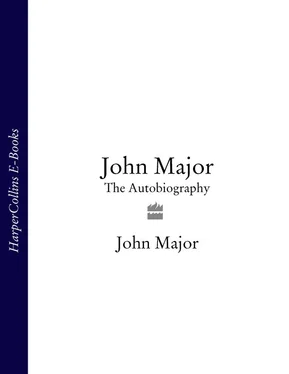Class distinction is to me exactly the same as racial distinction. The utter repulsiveness of racial prejudice is something that I have sensed since I was a child. I loathe the language of contempt or hatred. I expect always to be colour-blind and class-blind, and not to spurn or despise anyone on those grounds. Contempt is first cousin to hatred. It is best replaced by understanding.
What I believe in – and I make no apology for being unscientific about it – is a rough-and-ready decency. I should have advocated it more often and made a virtue of it. But to many politicians and onlookers today a rough-and-ready decency is not enough. They demand an ideology, intellectual mentors, a political template by which to judge every circumstance. I reject that. Most people simply do not think in that way. Of course there must be broad principles and recognised values to underpin political decisions, but to believe that decisions can only be in the national interest if they conform to the ideology of some guru must surely be nonsense. Let us have convictions by all means, but not the sort of convictions that are the flip-side of bigotry. A politician’s responsibility should above all be a readiness to do what is best in all the circumstances to deal with the issue at hand.
My politics was quiet politics. I disliked brash populism. I distrusted bitter conflict. I was at ease with the knitting-up of conciliation. It may have been boring to some, it may have been seen as grey, but it had its points. In Can You Forgive Her ?, the first of Anthony Trollope’s great political novels about the Palliser family, an aspirant candidate muses upon the duties of being an MP. He is duly elected, and serves his party and his country well. His name, I recall, was John Grey. And perhaps I should have reminded my critics of what the Impressionist painter Camille Pissarro wrote in a letter to his son Lucien, also a painter: ‘Never forget to make proper use of the whole dazzling range of greys.’ Hallelujah.
This book is not a history of our time. It is a personal odyssey that covers successes and failures but which ended in a crushing rebuff on May Day 1997. We – I – made mistakes. We paid for them. But we had successes too. On the day I became prime minister interest rates were 14 per cent, inflation 9.7 per cent, and unemployment 1.75 million, on its way to three million. When I left Number 10, interest rates were 6 per cent, inflation 2.6 per cent, and unemployment 1.6 million and falling. It was the healthiest economy any government had handed to its successors for generations. How we lost, despite this economic turnaround, is part of this story. In it I will not concede possession of the recent past to the mythographers of left or right who have every self-interest in retouching the history we made. For New Labour a Year Zero view of politics conveniently covers up the follies and errors of Labour’s past and denies the advances of good Conservative government.
Nor do I concede the Year Zero philosophy of some on the right. Conservatism was not discovered only in the 1980s, nor was it lost in the 1990s. Such a view is absurd. The 1980s were indeed great years of achievement and I was proud to have been a small part of them. But a proper respect for those achievements is not enhanced by rewriting history and denying the successes that preceded them, or those that have followed. Continuity matters to Conservatives. Some ideologues on the right forget that.
My great predecessor as Member of Parliament for Huntingdon, Oliver Cromwell, cautioned the painter Lely as he began a portrait of him: ‘Remark all these roughnesses, pimples, warts, and everything as you see me, otherwise I will never pay a farthing for it.’ He wanted an accurate portrait. So do I, and I have tried to achieve one. Politics, like life, is not all black and white. Sometimes it is grey, and in this story I have tried to colour in all its shades.
CHAPTER ONE The Search for Tom Major
I KNEW VERY LITTLE ABOUT my antecedents until I began writing this book. The search for my family provided many surprises.
As a boy, I soaked up the atmosphere of my parents’ unconventional life. When my father, Tom, was old and ill he would entertain me for hours with stories of the extraordinary things he had done. He painted vivid pictures of his boyhood in nineteenth-century America and of his own father, a master builder. He spoke of his years in show business and brought great entertainers like Harry Houdini and Marie Lloyd to life for me. He had a tireless fund of evocative stories and a formidable memory that stretched back well into the last century. He was a wonderful raconteur and I learned to be a good listener at his bedside.
No doubt my father could embroider for effect, but I never knew him to lie. Much was left out, as I was to discover, but whenever he exaggerated or embellished my mother hurried in to try to damp the story down. I grew up with his tales and accepted them without question, though his wayward life left little evidence for us to confirm what he said. After I joined the Cabinet in 1987 and the press began to delve into my past, an impression was sometimes given that I was withholding information. Not at all. I knew so little myself. But at that time my family, too, began to delve. The burden initially fell on my brother Terry. Later, when I started this book, we worked together. We had to piece together a life without documents that had begun 120 years before. It was a fascinating adventure. In the search for Tom Major, we unearthed a remarkable, idiosyncratic life.
His roots lay in the West Midlands. My great-great grandfather, Joseph Ball, was a prosperous Willenhall locksmith; his son, John Ball, born at the end of the Napoleonic Wars, was licensee of the Bridge Tavern, just outside Walsall. It still exists today. John and his wife Caroline had six children, of whom the second, Abraham Ball, born in January 1848, was my grandfather. He married a young Irish girl, Sarah Anne Marrah; illiterate, my grandmother signed my father’s birth certificate with an ‘X’. I never met her, of course, but I still have a photograph, taken not long before she died in 1919, of her feeding chickens at my father’s house in Shropshire. She looks a formidable lady, a not improbable mother of an adventurous and restless son. And my father certainly was that.
He was born in 1879, and christened Abraham Thomas Ball. But he was always known as Tom, and never Abraham. ‘Major’ was the stage name he adopted as a young man. Had he not done so, I would have been John Ball, sharing the name of the leader of the Peasants’ Revolt against the poll tax.
Tom was Abraham and Sarah’s only natural child, and I had always believed he had been brought up alone. He was not. In one of the many surprises I had while researching this book, I learned of an older adopted son, Alfred, born to a destitute bridle-bit maker. My grandparents, his neighbours, took Alfred in, and it was only when he married that he learned he was adopted. My father never spoke of him to me.
Brought up as brothers, Tom and Alfred did not spend long in the Midlands. When my father was about five my grandparents emigrated to America, and settled in Pittsburgh. They must have hoped for a better life. They sailed on the SS Indiana from Liverpool to Philadelphia, and were appalled by conditions on board. The Indiana was a primitive two-masted steamship belonging to the American Line, built for stability rather than speed or comfort. The journey took three weeks; poorer migrants, travelling as deck passengers, were fed, so my father told me, with salted herrings from a barrel – much like sea lions in a zoo. He was lucky, and travelled in better circumstances. In America, my grandfather soon found work as a master bricklayer, building blast furnaces for the Andrew Carnegie Steel Works in Philadelphia.
Читать дальше












